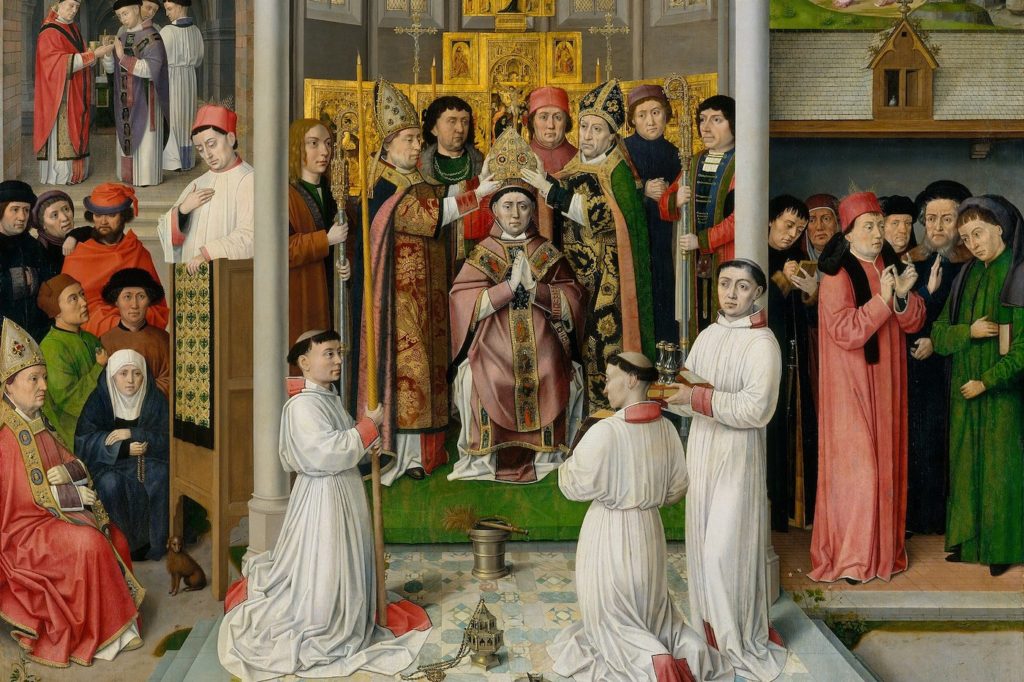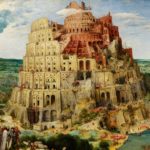One sign of a great text is that its questions and themes are eternal, which means that its insights are available to us at any moment. Augustine’s City of God is a great text that addresses two prominent crises at our present moment: identity politics and COVID.
In his recent study of identity politics, Joshua Mitchell writes that “any serious effort to untangle identity politics will require comparing the transliteration given here to what St. Augustine wrote and believed.” He claims that identity politics is a “religious” response to perennial questions about human flaws and suffering. Identity politics’ Manichaean presuppositions lead it to locate the source of evil in classes of people instead of the human heart or will. It scapegoats classes of people and is incapable of offering any hope of redemption or reconciliation. In viewing identity politics as a religious phenomenon, Mitchell makes the Augustinian claim that it is an instance of the earthly city parodying the city of God. It raises the perennial questions about justice, injustice, sin, and suffering, but its existential closure is symptomatic of the earthly city’s setting up of idols.
The second crisis The City of God illuminates is Western governments’ (as well as China’s) policy response to COVID-19. The governments’ dystopian attempts to impose lockdowns, mandates, and restrictions—all in the name of public safety—recall what Augustine says about the Roman imperial goal of securitas. The impossibility of eliminating the virus means that there is no endpoint for the lockdowns. Like the Romans addicted to their vain hope of obtaining security and liberty by endlessly expanding the empire, so too Western societies (and China) are locked in a cycle of imposing draconian measures, vainly hoping to achieve a goal that can never be obtained. Securitas is the earthly city’s fundamental illusion.
Both crises show the face of what Augustine calls the earthly city (civitas terrena) because both seek a politics of perfection. In both cases, temporal things are loved as if they were eternal. Augustine identifies the earthly city with disordered love of self and contempt of God. By contrast, the city of God is the ordered love of God and contempt of self. Both cities, then, are metaphors for these different desires. Augustine’s earthly city cannot be equated with any actual cities. He did not identify it with Rome, nor should we identify it with any current political society. Rather, Augustine’s two cities represent the kind of community that ordered and disordered desire would produce.
Start your day with Public Discourse
Sign up and get our daily essays sent straight to your inbox.So while the earthly city can’t be directly mapped onto a real political community, its insights about the communal distortions caused by disordered love can shed light on real regimes. What, then, does Augustine teach us about the earthly city?
City of Lies
Assumption University’s Veronica Roberts Ogle has written a timely study of Augustine’s understanding of the earthly city in Politics and the Earthly City in Augustine’s City of God (Cambridge 2020), and helps us understand better how the earthly city, “parodying” the city of God, necessarily produces illusions and lies. These falsities trap the earthly city’s inhabitants in what is an essentially nihilistic dreamworld. Ogle writes, “For Augustine, then, the earthly city is defined by its perpetual attempt to edit the original meaning of reality—to erase meanings it does not like, and to reinforce illusions in which it has a stake.”
She provides the reader with one of Augustine’s unforgettable images of the earthly city’s absurdity: “Could a man escape starvation by licking the painted picture of a loaf, instead of begging real bread from someone who had it to give?” Entrapped, confused, and beguiled by its illusions, we stupidly persist in licking the picture of the loaf while ignoring real bread. By treating temporal goods as if they were eternal—e.g., by loving our friends as if they were immortal gods, as Augustine confesses he once did—we become trapped in dreamworlds that produce anxiety, confusion, and alienation from both truth and one another. It is our fatal error, Augustine writes, “[t]o participate in the earthly city and, thereby, to approve of others’ investment in the same myth insofar as it reinforces your own.” He continues: “Confusion defines the earthly city.”
Based on amor sui, the earthly city is necessarily self-regarding. In it, true love of neighbor is impossible. Friendship and the common good can’t fully escape self-love: we inevitably keep something of us to ourselves. Love of the other in earthly terms is necessarily self-regarding. Thus, Augustine would probably approve of Blaise Pascal’s assessment of early modern attempts to render love of neighbor superfluous through systems that channel libido dominandi into public benefits (e.g., the early moderns who say that private vices produce public virtues): “All men naturally hate one another. We have used concupiscence as best as we could to serve the public good. But this is only a pretense and a false image of charity. For at bottom, it is only hate.”
Over the span of six chapters, Ogle explores Augustine’s insights into the ways amor sui and libido dominandi are hidden beneath Roman customs, histories, and philosophies. In so doing, she shows him to be perhaps the original critical theorist who deconstructs power relations as systems of domination. In his critique of Roman customs, Augustine unmasks the violence of the earthly city’s systemic injustice.
Based on amor sui, the earthly city is necessarily self-regarding. In it, true love of neighbor is impossible. Friendship and the common good can’t fully escape self-love: we inevitably keep something of us to ourselves.
Barricading against the Earthly City
But Augustine goes beyond mere unmasking. Ogle shows that his critique takes place within a broader sacramental vision that aims at purging amor sui and orienting it toward amor Dei. Thus, in Ogle’s reading, Augustine’s exhaustive critique of the earthly city is meant not to identify it with the political sphere but to make conceptual space for us to live in the political sphere without participating in the earthly city. In doing so, she recaptures Augustine’s argument that Christianity does not undermine citizenship so much as improve it. Christianity safeguards us from the snares of self-glorification and self-enslavement that citizenship can produce.
Augustine, Ogle explains, wants to reclaim the distinction between the earthly city—defined by self-love—and the political sphere, which can be influenced by grace. Contrary to a lot of scholarship, she claims that Augustine regarded politics as a natural good, and conducive to a certain range of virtues needed for human flourishing. Her analysis goes well beyond the conventional view that Augustine thought that politics is the result and a certain kind of punishment for sin. She notes how politics aims at a kind of friendship, or “harmonia,” and draws comparisons with one of Augustine’s great teachers on politics, Cicero.
Ogle’s examination clears the earthly city’s underbrush, as it were, and clarifies the terms—most notably friendship—on which an Augustinian politics might proceed. This question is worth pondering in light of recent concerns about liberal democracy’s participation in the earthly city, which include recent criticisms that liberalism, on account of materialism and individualism, fails to cultivate the virtues required to sustain a free society. In this light, Ogle rejects integralism as an Augustinian option because politically imposed religious orthodoxy is a false solution: “[T]he fact Augustine passes over Constantine’s Christianization of the empire in silence speaks volumes.”
Love of God in Politics
Ogle reads Augustinian politics as a matter of amor Dei providing a basis for politics, which is a natural good. His politics resembles Cicero’s, with its emphasis on communities defining the res publica. But unlike Cicero, Augustine’s account of the person is predicated on his turning amor sui into amor Dei. This act places love prior to justice, creating a new order that transforms the res publica from homeland or patria into a temporary resting spot for the pilgrim. For Augustine, political bonds are fundamentally reoriented toward friendship. Ciceronian politics shares this aim, but Augustine’s framework of ordered love better actualizes it.
Ogle characterizes the Augustinian res publica as an ongoing process of fraternal correction. Augustine’s res publica also supplements ordinary civic bonds with neighborly love, which requires citizens to treat all, including enemies, as potential friends. At its best, Augustine’s res publica is defined by an elevated form of political friendship that is luminous to all others. It is nourished by members whose hearts are uplifted by love of God and neighbor through worship and service (latreia). Such witnesses—potential martyrs—prove, according to Augustine, a “burdensome nuisance” to others in the political sphere that is reminiscent of Socrates’ gadfly behavior in Athens. Love of God and neighbor can uplift but never amount to the earthly city. Such holy witness will always be external to it.
Augustine emphasizes that politics can only be improved by personal responses to grace—something no political institution can hope to generate. Improvement of political spaces must occur beyond politics.
In purging amor sui to lead us to amor Dei, Augustine aims at cleansing our souls of the lust for securitas. As Ogle notes, Augustine emphasizes that politics can only be improved by personal responses to grace—something no political institution can hope to generate. Improvement of political spaces must occur beyond politics. Even so, Ogle’s discussion of purgation of this point tends to glide over just how physically and psychologically painful this process really is. Augustine displays the horrors of the earthly city in City of God. But the Confessions show him shedding numerous tears as his own sin becomes painfully unravelled by grace.
It would be well for all of us, especially those aspiring to rule, to prove the seriousness of our desire to serve by imitating Christ’s forty days in the desert to undergo purgation. This practice may help cure the two forms of earthly city that plague contemporary politics, identity politics and the securitas that COVID policies seek to attain. Such practice may promote the sort of introspection that Augustine advocated after he discovered that the source of evil is not to be found in our bodies—but in every person’s will.
Augustine teaches us how to avoid the fantasy of securitas that seeks a world free from stains left by undesirable classes of people. We discover the source of evil when we turn inward and contemplate our wills as their source, the site where we choose between the earthly city and the city of God. Alexander Solzhenitsyn famously expressed this Augustinian turn inward as a liberation from the ideological earthly city when he was “rotting” on “prison straw” in the gulag: “Gradually it was disclosed to me that the line separating good and evil passes not through states, nor between classes, nor between political parties either—but right through every human heart—and through all human hearts.” Ogle shows how Augustine can help us identify the earthly city, both external and internal to us, and then seek redemption.














